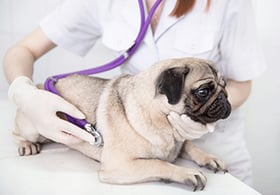As responsible pet parents, you understand the importance of preventive medicine and annual wellness visits. To make the most of these visits, the team at Best Friends has developed a list of the top 5 questions you should ask your vet during your next visit.

1. Am I feeding my pet the right food for their age or medical issues?
Choosing the right diet is one of the simplest and most important things you can do to improve and maintain your pet’s health. Different diets are formulated specifically for different ages and lifestyles. For example, there are weight management diets for overweight pets (a VERY common problem) as well as diets for pets with skin allergies. There are also diets made to help pets that have specific medical issues such as kidney disease or intestinal disease. Your veterinarian can help you decide which diet is best for your pet’s needs.
2. Are there any blood tests that my pet should have performed routinely?
In addition to annual tests for heart worm and intestinal parasites, your veterinarian may recommend some other tests such as a complete blood count (CBC), chemistry panel, urinalysis, or thyroid level. This recommendation may depend on your pet’s age – senior pets should have these tests done every year as part of their wellness exam. These tests may also be recommended if there are any problems you are seeing at home such as an increase in thirst or urination, a decrease in appetite, vomiting, or diarrhea. These tests help look for issues such as anemia, liver disease, kidney disease, or other metabolic problems.
3. Is my pet overweight?
Obesity is a common problem that we see every day among our pets. Just like with people, diet and exercise play an important part in keeping them healthy. If your dog is overweight, your veterinarian may recommend a specific weight loss diet or give you recommendations on how much food you should be feeding. Depending on their health, your vet can also recommend an exercise plan – more walking, time spent at a dog park, etc. For kitties, new cat toys or food puzzles that encourage playing, running, and jumping may be helpful in increasing their activity.
4. Are there any vaccines or preventive medications we need based on our lifestyle?
Vaccines, especially in young animals, are critical in helping decrease the risk of our pets becoming sick. Which vaccines your pet needs and how often they need them, will depend on factors such as age, health status, and lifestyle. The same is true for things such as flea and tick preventive. For example, dogs that hunt or spend a lot of their time outdoors, may have an increased risk of tick exposure. Routine heart worm prevention is also crucial and should be given year round.
5. How are my pet’s teeth and what can I do to keep them healthy?
Dental care is often one of those things gets overlooked by many pet parents, but it is also an important part of keeping our pets healthy. Just as in people, dental disease can lead to chronic inflammation in the body, infections, and pain and tooth loss that can affect appetite and quality of life. Your veterinarian can assess your pet’s dental health and let you know if a dental cleaning is recommended. They can also show you how to brush your pet’s teeth at home and what products to use to keep their teeth healthy.
Remember, this is YOUR time with your veterinarian so ASK QUESTIONS. As a proactive pet parent, you can help your vet and the veterinary team keep all of your furry family members happy and healthy.




